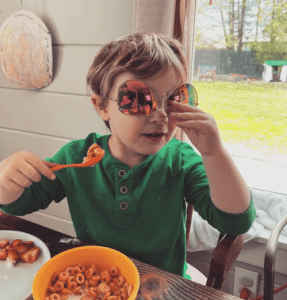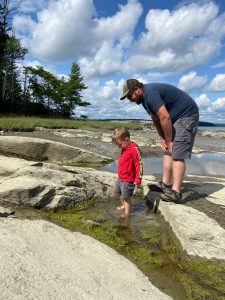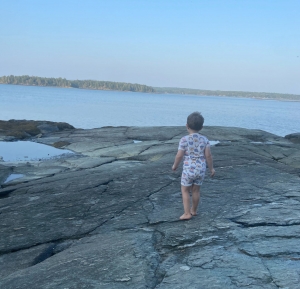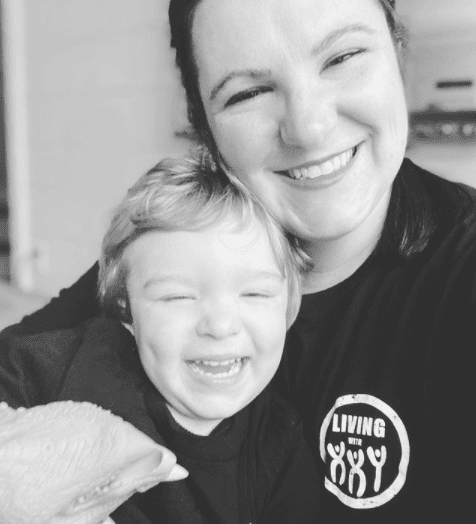I jumped on Instagram for some mindless scrolling this afternoon, and was excited to see a new video by comedian Laura Clery. Laura candidly shares her struggles with addiction, motherhood, postpartum depression, and today, her son Alfie’s recent diagnosis of autism. The tone of this video was different than her usual funny clips, and the reality of what she shared struck me deeply. While my son isn’t autistic, many things Laura said resonated with me.
I know what it’s like to have a child that’s “different” from his peers, and who may face judgment during his life from those who are misinformed. I know the deep pain that brings, but also know the intense, incredible joy that comes from raising a child who is superbly beautiful inside and out. He wouldn’t be who he is without that extra X chromosome.
I know there are many in the Klinefelter syndrome community who also share a diagnosis of autism. When I was younger, I worked with autistic children as a community support worker. I spent several years caring for children with varying levels of autism, but what stayed with me was their many, many positive attributes. Even though they had some challenges (like we all do), such as being nonverbal or experiencing sensory processing differences, the core of who they were as human beings was what I focused on. Their beautiful smiles, their senses of humor, their interests, and their discovery of how the world worked. These were the things that made them who they were, and not the negative “symptoms” of autism.
Through tears, bouts of anger, and even laughter, Laura shared the hours of research she’d put into learning about Alfie’s diagnosis of severe autism. I remembered how it felt to learn about my son’s Klinefelter syndrome diagnosis. Like Laura, I felt overwhelmed, shocked by the lack of accurate, supportive information available, and disturbed by the focus on the negatives.


Like autism, Klinefelter syndrome is a spectrum disorder. The severity of how a person is impacted varies, as do the symptoms themselves. Noah may experience symptoms other children will not, and vice versa. Some of the things he struggles with may or may not be the things other children struggle with. We simply cannot know yet how his life will unfold, or what challenges he may face. We can only watch, wait, and support him.
I cried when Laura declared “we’re all worthy just by simply being alive”. That’s what I want to focus on: you are worthy. Our sons are worthy. It doesn’t matter how many extra chromosomes they have, or what symptoms may or may not manifest as they age. It doesn’t matter if they can throw a baseball, or if they’re shyer, or what their bodies look like (even though kids with Klinefelter syndrome can absolutely throw a ball, aren’t really any more shy than other children, and have the body they’re meant to have). Those things, the negatives written on websites, are not the total sum of your child’s worth. They are worthy of love, respect, of being able to move through the world safely without judgment. We are all entitled to this as human beings, and children with “differences” aren’t any less valuable.
It can absolutely feel overwhelming and devastating to receive a diagnosis of Klinefelter syndrome. However, I want to encourage you not to live in that place. Acknowledge those feelings, feel them, sit with them as long as you need, but don’t let them consume you. Please don’t allow the negatives out there, the pressures of society, or the ignorance of others to allow you to have even a moment’s less joy in your child.


Laura set herself a goal of meeting Alfie halfway; of learning about his world and teaching him about hers. I encourage you to do the same with your child. Learn about who he is, what he loves, what he doesn’t, and how he experiences the world. Share your world with him, so he understands how to navigate it as he grows up. Embrace his differences, and see the positives in them. Children with Klinefelter syndrome are so many outstanding things. They’re smart, compassionate, introspective, thoughtful, and kind. They’re also considerate, artistic, funny, articulate, innovative, and beautiful. So many are great with their hands, generous, responsible, and reliable. I mean, who wouldn’t want a child like that?
Whether your son has been newly diagnosed, or you’ve known about the diagnosis for some time, you aren’t alone. The community is here, for you, and for your son. We’ve got you, and we aren’t going anywhere.




One Response
I ran across this post and so glad I did! I’m thrilled that doctors are now diagnosing young boys with KF! My son was 20 when we finally received the diagnosis. As an educator I knew something was wrong with him mentally, socially, academically, and physically growing up. The puberty years were the worst. Not having the testosterone needed for puberty was horrible for my son and those around him. He’s 32 now has a job he enjoys. He’s handsome, kind, loves his job and goes to therapy to deal with this stage of his life. Hopefully he’s on the right track and will be able to go into his 40s where he needs to be. Being a KF mother is one of the hardest things you’ll experience at times but the best bond you will have is just being there for him and he feels secure he can come to you